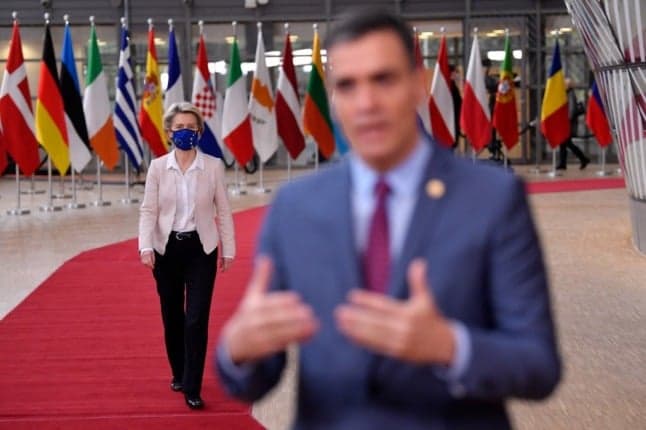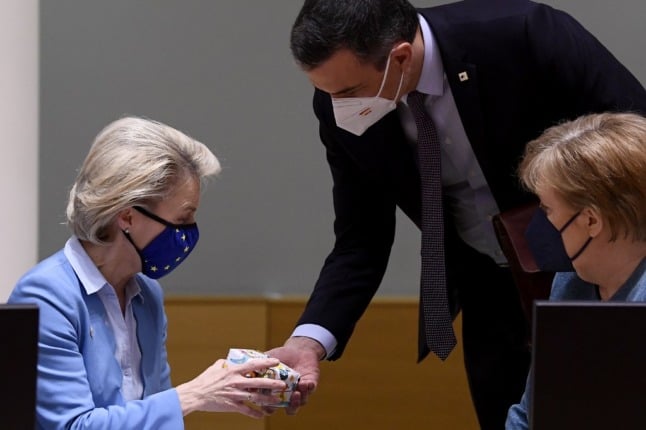'Extraordinary generosity': EU chief lands in Madrid to launch Spain's €140-billion recovery plan

European Commission chief Ursula von der Leyen visits Lisbon and Madrid Wednesday where she will begin approving recovery plans submitted by nations seeking funding from the bloc's coronavirus recovery fund.
"This is a historic achievement," von der Leyen told the European Parliament last week in announcing the imminent activation of the landmark €750-billion ($910-billion) recovery plan which was drawn up nearly a year ago.
Spain is due to receive €140 billion ($167 billion) — half in direct payments, half in loans — between 2021 and 2026.
The choice to start in Portugal and Spain is symbolic.
Portugal, which currently holds the EU's six-month rotating presidency, has made the rapid adoption of these recovery plans a priority following their recommendation by the Commission.
And the government of Socialist Prime Minister Antonio Costa set a good precedent by being the first country to submit its own plan in April.
Spain is also a significant choice in that it will be the second-largest beneficiary of the rescue fund after Italy.
 Ursula von der Leyen (L) receives a gift from Spain's Prime Minister Pedro Sanchez as Germany's Chancellor Angela Merkel looks on during an EU summit in May. (Photo by JOHN THYS / POOL / AFP)
Ursula von der Leyen (L) receives a gift from Spain's Prime Minister Pedro Sanchez as Germany's Chancellor Angela Merkel looks on during an EU summit in May. (Photo by JOHN THYS / POOL / AFP)
'Extraordinary generosity'
"Two southern European countries that previously did not feel supported within Europe have now benefitted from the extraordinary support and generosity of their northern partners," said Toni Roldán, head of research at the Esade Centre for Economic Policy (EsadeEcPol) in Madrid.
Spain was particularly hard hit when the pandemic first erupted in early 2020, while Portugal suffered a major surge in cases at the start of this year.
With both countries hugely dependent on tourism, their economies have been significantly affected.
Since the eurozone debt crisis which began in 2011, Lisbon and Madrid have often been in the firing line with Europe's more "frugal" members frustrated at having to fork out money to subsidise spending in what they have seen as the somewhat less virtuous south.
Although some of the conditions attached to the stimulus packages remain vague, Spain and Portugal could have shown "greater reformist ambition" in using the money, particularly in the area of education, Roldan told AFP.
"I understand it's difficult for the Commission to demand deep reforms in this complicated environment with the rise of populism and all the post-pandemic suffering, but at the same time, it's the best moment."
Green transition
In Lisbon, von der Leyen will head to a science exhibition centre to meet Costa, whose country is to receive 16 billion euros in funding.
She then flies to Madrid to meet Socialist Prime Minister Pedro Sanchez at the headquarters of the national electricity board with Spain to drive the bulk of its funding into the green transition.
On Thursday, von der Leyen will head to Greece and Denmark, and then on to Luxembourg the next day on a tour that will take her to most member states.
Since the end of April, 23 governments have submitted investment and reform plans to Brussels for approval. The Commission has two months from the date of submission to give its opinion after which the European Council must give its approval within a month.
READ ALSO:
Comments
See Also
"This is a historic achievement," von der Leyen told the European Parliament last week in announcing the imminent activation of the landmark €750-billion ($910-billion) recovery plan which was drawn up nearly a year ago.
Spain is due to receive €140 billion ($167 billion) — half in direct payments, half in loans — between 2021 and 2026.
The choice to start in Portugal and Spain is symbolic.
Portugal, which currently holds the EU's six-month rotating presidency, has made the rapid adoption of these recovery plans a priority following their recommendation by the Commission.
And the government of Socialist Prime Minister Antonio Costa set a good precedent by being the first country to submit its own plan in April.
Spain is also a significant choice in that it will be the second-largest beneficiary of the rescue fund after Italy.
 Ursula von der Leyen (L) receives a gift from Spain's Prime Minister Pedro Sanchez as Germany's Chancellor Angela Merkel looks on during an EU summit in May. (Photo by JOHN THYS / POOL / AFP)
Ursula von der Leyen (L) receives a gift from Spain's Prime Minister Pedro Sanchez as Germany's Chancellor Angela Merkel looks on during an EU summit in May. (Photo by JOHN THYS / POOL / AFP)
'Extraordinary generosity'
"Two southern European countries that previously did not feel supported within Europe have now benefitted from the extraordinary support and generosity of their northern partners," said Toni Roldán, head of research at the Esade Centre for Economic Policy (EsadeEcPol) in Madrid.
Spain was particularly hard hit when the pandemic first erupted in early 2020, while Portugal suffered a major surge in cases at the start of this year.
With both countries hugely dependent on tourism, their economies have been significantly affected.
Since the eurozone debt crisis which began in 2011, Lisbon and Madrid have often been in the firing line with Europe's more "frugal" members frustrated at having to fork out money to subsidise spending in what they have seen as the somewhat less virtuous south.
Although some of the conditions attached to the stimulus packages remain vague, Spain and Portugal could have shown "greater reformist ambition" in using the money, particularly in the area of education, Roldan told AFP.
"I understand it's difficult for the Commission to demand deep reforms in this complicated environment with the rise of populism and all the post-pandemic suffering, but at the same time, it's the best moment."
Green transition
In Lisbon, von der Leyen will head to a science exhibition centre to meet Costa, whose country is to receive 16 billion euros in funding.
She then flies to Madrid to meet Socialist Prime Minister Pedro Sanchez at the headquarters of the national electricity board with Spain to drive the bulk of its funding into the green transition.
On Thursday, von der Leyen will head to Greece and Denmark, and then on to Luxembourg the next day on a tour that will take her to most member states.
Since the end of April, 23 governments have submitted investment and reform plans to Brussels for approval. The Commission has two months from the date of submission to give its opinion after which the European Council must give its approval within a month.
READ ALSO:
Join the conversation in our comments section below. Share your own views and experience and if you have a question or suggestion for our journalists then email us at [email protected].
Please keep comments civil, constructive and on topic – and make sure to read our terms of use before getting involved.
Please log in here to leave a comment.